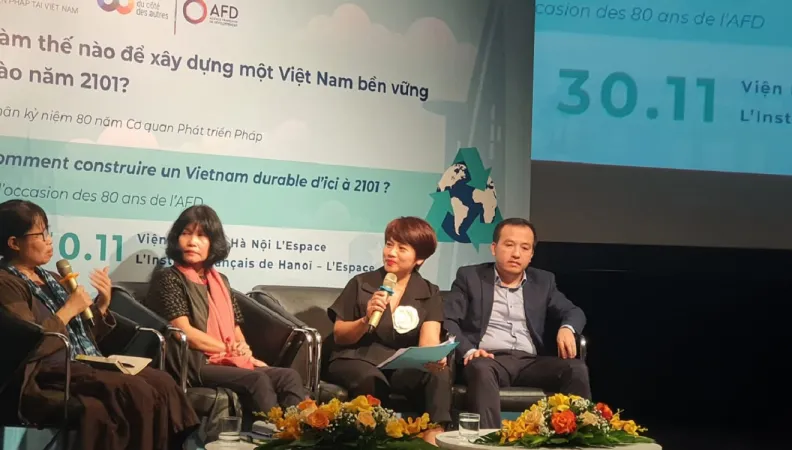Share the page
How to Build a Sustainable Vietnam By 2101?
Published on

On its 80th anniversary, Agence Française de Développement organized a conference on solutions for building a sustainable Vietnam by 2101, bringing together members of civil society, the private sector and the country's academic community.
"What kind of world will we live in and what kind of world do we want in 2101?" asks Hervé Conan, AFD's Director in Vietnam. “This may seem very far away, but the world of tomorrow is being prepared today."
The choice of Vietnam to host this conference was not made by chance. As the French Ambassador to Vietnam, Nicolas Warveny reminds us, "Vietnam is one of the countries most exposed to the consequences of climate change, pollution, soil erosion, salinization of the two deltas and loss of biodiversity.
A Vietnam without masks
"What I would like to see in 2101 is first of all a Vietnam where we don't have to wear masks. Masks to protect against disease, of course, but also against pollution," said Do Van Nguyet, founder and director of the Vietnamese NGO Live & Learn for Environment and Community, at the start of the conference. “Long before the pandemic, their use was already widespread in major cities because of alarming air quality levels. We need to start taking the necessary steps to reduce this pollution.”
A vision shared by Nguyen Thi Nhung, Director of the Openasia Group: "We must act and protect our environment today. We can't ask others to do it if we don't do it at home.” She added: "the private sector has a role to play, by committing to a sustainable path rather than one that is lucrative at all costs.”
Nature-based solutions
For Vu Canh Toan, technical manager of the Institute for Social and Environmental Transition, the main challenge for building a sustainable Vietnam over the next 80 years is to tackle the root causes of climate change and biodiversity degradation. "To take an example from my experience, urban flooding is made worse by human actions,” he said. “In Hanoi, green spaces have decreased by 50% over the last ten years, destroying natural water retention areas. We need to look at nature-based solutions.”
In the end, as the various speakers and moderator Do Thuy Duong, editor and founder of the TalentPool-LAB management institute, reminded us, building a sustainable Vietnam will require not only government policy, but the whole society. And for that to happen, it is necessary to improve the public’s understanding of climate issues. "Collective awareness is necessary to achieve Vietnam's climate objectives and a great deal of awareness-raising must be carried out,” said Do Thuy Duong, “so that everyone understands that today's actions make it possible to build a more sustainable future.”
